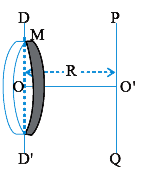Moment of inertia of a solid about its geometrical axis is given by 1=25MR2 where M is mass & R is radius. Find out the rate by which its moment of inertia is changing keeping dnsity constant at the moment R=1m, M=1kg & rate of change of radius w.r.t. time 2ms−1
4kgms−1
2kgm2s−1
4kgm2s−1
None of these
The correct Answer is:C
To find the rate at which the moment of inertia I of a solid is changing, we start with the formula for the moment of inertia about its geometrical axis:
I=25MR2
Where:
- M is the mass of the solid,
- R is the radius of the solid.
Given:
- M=1kg
- R=1m
- The rate of change of radius dRdt=2m/s
Step 1: Express Mass in terms of Density and Volume
Since the density ρ is constant, we can express mass M in terms of density and volume. The volume V of a solid sphere is given by:
V=43πR3
Thus, the mass M can be expressed as:
M=ρV=ρ(43πR3)
Step 2: Substitute Mass into the Moment of Inertia Formula
Substituting M into the moment of inertia formula gives:
I=25(ρ43πR3)R2=815πρR5
Step 3: Differentiate Moment of Inertia with Respect to Time
Now, we differentiate I with respect to time t:
dIdt=815πρddt(R5)
Using the chain rule, we have:
ddt(R5)=5R4dRdt
Thus, we can write:
dIdt=815πρ⋅5R4dRdt
Step 4: Substitute Known Values
Now we substitute the known values into the equation:
- R=1m
- dRdt=2m/s
We also need to find the density ρ using the mass and volume at R=1m:
ρ=MV=1kg43π(1)3=34πkg/m3
Now substituting R=1m and ρ=34π:
dIdt=815π(34π)⋅5(14)(2)
Step 5: Simplify the Expression
Now simplify the expression:
dIdt=815⋅34⋅5⋅2
Calculating this gives:
dIdt=8⋅3⋅5⋅215⋅4=24060=4kg m2/s
Final Answer
Thus, the rate at which the moment of inertia is changing is:
dIdt=4kg m2/s
- M is the mass of the solid,
- R is the radius of the solid.
- M=1kg
- R=1m
- The rate of change of radius dRdt=2m/s
Since the density ρ is constant, we can express mass M in terms of density and volume. The volume V of a solid sphere is given by:
Substituting M into the moment of inertia formula gives:
Now, we differentiate I with respect to time t:
Now we substitute the known values into the equation:
- dRdt=2m/s
Now simplify the expression:
Thus, the rate at which the moment of inertia is changing is:
Topper's Solved these Questions
- MISCELLANEOUSBook:ALLENChapter:MISCELLANEOUSExercise:Exercise-03
Explore 1 Video
- MISCELLANEOUSBook:ALLENChapter:MISCELLANEOUSExercise:Exercise-04
Explore 1 Video
- MISCELLANEOUSBook:ALLENChapter:MISCELLANEOUSExercise:Exersice -05(B)
Explore 19 Videos
- KINEMATICS (MOTION ALONG A STRAIGHT LINE AND MOTION IN A PLANE)Book:ALLENChapter:KINEMATICS (MOTION ALONG A STRAIGHT LINE AND MOTION IN A PLANE)Exercise:BEGINNER S BOX-7
Explore 8 Videos
- PHYSICAL WORLD, UNITS AND DIMENSIONS & ERRORS IN MEASUREMENT Book:ALLENChapter:PHYSICAL WORLD, UNITS AND DIMENSIONS & ERRORS IN MEASUREMENT Exercise:EXERCISE-IV
Explore 8 Videos
Similar Questions
The moment of inertia of a solid sphere about an axis passing through the centre radius is 25MR2 , then its radius of gyration about a parallel axis t a distance 2R from first axis is
View SolutionThe moment of inertia of a solid cylindrer about its axis of ratation is MR22. What is the value if the radius of gyration of the cylinder about this axis ?
View Solution
Knowledge Check
The moment of inertia of a hoop of radius R and mass M, about any tangent
A[3mR2]/2B[mR2]/2CMR2D[MR2]/4
Moment of inertia of a ring of radius R about a diametric axis is 25kg m2. The MI of the ring about a parallel axis at a distance R from the centre is
View SolutionThe moment of inertia of a solid cylinder about its axis of rotation is MR22. What is the value of the radius of gyration of the cylinder about this axis ?
View SolutionThe moment of inertia of a uniform cylinder of length landradiusR about its perpendicular bisector is I. What is the ratio l/R such that the moment of inertia is minimum ?
View SolutionThe moment of inertia of a solid sphere of radius R about its diameter is same as that of a disc of radius 2R about its diameter. The ratio of their masses is
View SolutionMoment of inertia of a circular wire of mass M and radius R about its diameter is
View SolutionMoment of inertia of a cylindrical shell of mass M, radius R and length L about its geometrical axis would be -
View SolutionThe moment of inertia of a ring of mass M and radius R about PQ axis will be

View Solution
